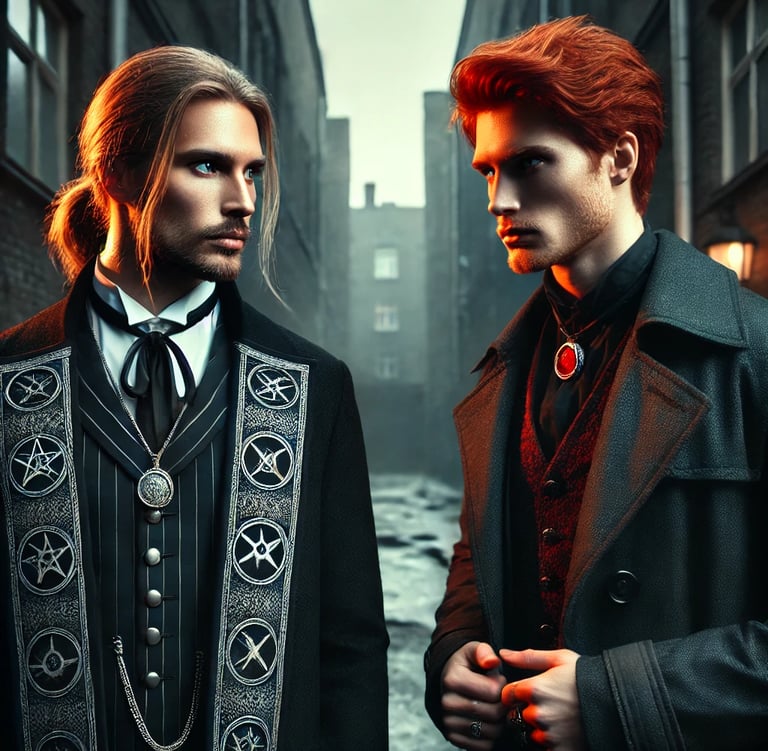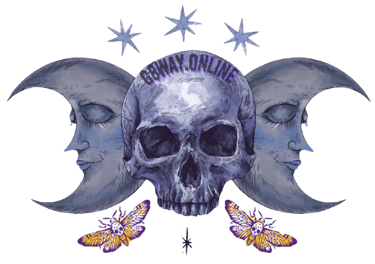Wizards & Warlocks: Who’s Who & What’s What
Wizards, Warlocks Which Doctors and Shamans... Titles steeped in lore and apparently lazy dictionary entries. Evidence suggests that all these names are synonyms and are not to be confused with each other at all because they are all one and the same.
WIZARDSWARLOCK
Lya Brk Ujv
3/23/20253 min read


A wizard, as commonly understood, is someone who learns magic through study and experimentation—essentially an arcane scientist, methodically unraveling the mysteries of the universe. Meanwhile, warlocks are often equated with male witches, frequently described as practitioners of black magic, betrayers of their kind, or outright sorcerers. But where do these distinctions actually come from, and why do they seem so arbitrary?
The Faulty Foundations of Definition. Merriam-Webster, Oxford English Dictionary (OED), and other linguistic authorities do a laughable job at differentiating these terms. According to Merriam-Webster:
- Wizard – “One skilled in magic”
- Warlock – “A man practicing the black arts; a sorcerer”
For starters, both terms use 'sorcerer' interchangeably, as if wizards, warlocks, and sorcerers are just different flavors of the same thing. Meanwhile, witches are defined separately, usually with a gendered slant, reinforcing outdated societal biases. It seems the dictionary penholders have little concern for accuracy beyond what pop culture has recycled over the years.
And let’s be honest—when modern references to these terms are overwhelmingly tied to Gandalf, Harry Potter, and Dungeons & Dragons, something has gone seriously wrong. Are these really the best representations of historical magical practitioners? Facepalm!
The Warlock's Curse—A Stigmatized Title
The term warlock has a particularly muddled history, and not in the way the dictionary suggests. It stems from the Old English wǣrloga, meaning "oath-breaker” or “traitor.” This association was largely driven by the Christian demonization of magic and those who practiced it. The term became a tool to single out and vilify male witches, ensuring that even within magical persecution, women weren’t suffering alone—men accused of witchcraft got their own special brand of slander.
Of course, this raises a key question: If a male magic-user is automatically an “oath-breaker” or a practitioner of “black arts,” does that mean male witches were considered inherently evil? That distinction didn’t apply to wizards, reinforcing the idea that one could study magic (wizardry) and be accepted, but to be naturally gifted or to practice folk magic (witchcraft/warlockry) made you a heretic.
Wizards: The Academics of the Occult
Unlike warlocks, wizards were given a pass—likely because their image aligned more closely with scholarly pursuits. Figures like John Dee, the alchemist and astrologer of Queen Elizabeth I’s court, weren’t labeled warlocks or witches; they were respected for their esoteric knowledge. The distinction seems to hinge on whether magic was learned (wizard) versus instinctual or ritualistic (witch/warlock).
This artificial separation echoes the way shamans and witch doctors have been defined in Western academia. In many traditions, the only real difference between a shaman and a witch doctor is that one was classified by Western scholars as “spiritual” while the other was demonized as “primitive.” The same pattern appears with wizards and warlocks—one gets the intellectual prestige, the other gets vilified.
The Male Witch Dilemma
Beyond semantics, society has long struggled with the idea of male witches. Despite the fact that men have historically practiced folk magic, divination, and occult sciences, they are often either erased from the narrative or twisted into something sinister.
From the Salem witch trials to modern-day Wicca, male witches and warlocks remain outliers in a culture that still ridicules witchcraft while paradoxically consuming it as entertainment. Meanwhile, female witches—though still vilified—are at least acknowledged. Men in the craft, however, are either ignored or deemed dangerous. This leaves us in need of a linguistic reboot if we really want to fix these definitions.
Let’s make it simple: Sorcerers are Wizards and Wizards are Warlocks. Don't split hairs. Boom. Problem solved.
Expecting dictionaries to revert to original meanings let alone revise their current definitions is a tall order, considering they’ve spent centuries reinforcing exclusions, biases, and outright falsehoods. The OED and its ilk have no problem updating words like “selfie” and “twerk” but can’t be bothered to correct the historical misrepresentation of magical practitioners? These were thee proverbial "scientists" before there was a such thing! That’s some real betrayal right there.
Maybe it’s time for a new dictionary—one written by those who actually understand magic, rather than those who fear it.


WWW.G8WAY.ONLINE
Thank You for Your patronage.
G8WAY intellectual property found herein is branded as such and most graphic interchange formats along with all links lead to external businesses not owned or operated by G8WAY. If you own any image included here and wish to request its removal or proper attribution, please contact admin@g8way.online and G8WAY will respond as promptly as possible. Please note: a page’s presence in G8WAY does not imply it is complete. Each entry is a living document that may be subjected to editorial corrections and/or additions. G8WAY may earn a commission when users make a purchase through links posted throughout this site. Information on WWW.G8WAY.ONLINE is opinionative and for entertainment purposes only and should not be considered professional advice. Thank You for Visiting! G8WAY.ONLINE ©2025 All rights reserved.
